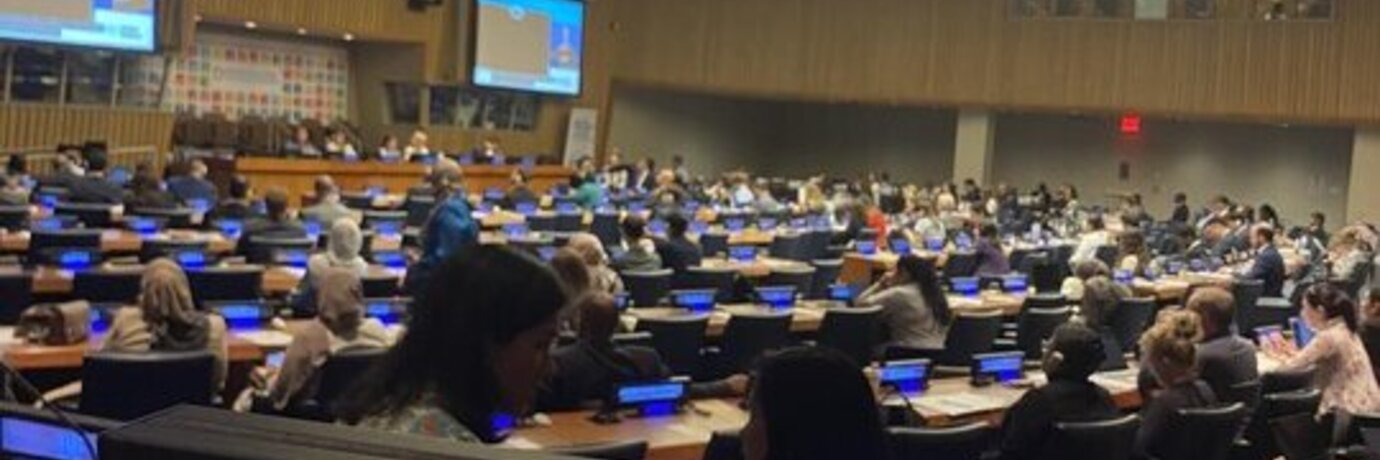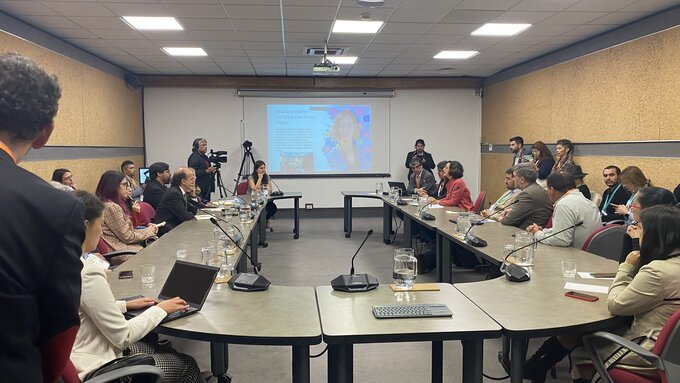Further information
The pursuit of sustainable development is an endeavor that unites nations, communities, and individuals in a shared commitment to address global challenges. The High-Level Political Forum (HLPF) stands as a beacon of hope and opportunity within this journey, theoretically providing a platform for dialogue, reflection, and action. In this article, we delve into my experiences and insights gained from participating in the HLPF, shedding light on critical themes and discussions surrounding the Sustainable Development Goals (SDGs).
The Imperative Need for Speed: Accelerating the SDG Agenda
A resounding message echoed through the halls of the HLPF: a call for urgency. The clock is ticking, with only 6-7 years remaining to fulfill the SDGs, making the need for accelerated action undeniable. The 2030 Agenda presents a comprehensive roadmap to address issues ranging from poverty eradication to climate action, and each passing day is a precious resource in this race against time.
The urgency of the SDGs serves as a stark reminder that, while global awareness of their importance is growing, translating intentions into tangible results is a complex task. Governments, organizations, and individuals must work in harmony, driven by the long-term sustainability of our planet and its people rather than short-term gains.
Battling Pessimism: A Glimpse into the Challenges Ahead
Amidst the enthusiasm and dedication of HLPF participants, a cloud of pessimism persisted. Doubts lingered about our collective ability to achieve the SDGs within the established timeframe. While pessimism can be paralyzing, it should instead serve as a catalyst for revitalized efforts. The HLPF is a testament to the fact that, although significant progress has been made in recognizing the importance of the SDGs, the path to effective implementation remains challenging.
Multisectoral and Integrated Implementation
A key pillar of HLPF discussions was the need for multisectoral and integrated implementation of the SDGs. These goals are interconnected and multifaceted, demanding a comprehensive approach to their realization.
Emphasis was placed on the need to involve all sectors of society and all levels of government in this implementation, underscoring the importance of collaboration between national governments, local authorities, the private sector, nonprofit organizations, and civil society. Addressing global challenges requires a coordinated and synergistic approach.
The interconnectedness of the SDGs means that progress in one area can have a positive impact on others. For example, improving education (SDG 4) can contribute to gender equality (SDG 5) and reduce inequality (SDG 10). This interconnectedness emphasizes the need for comprehensive and coordinated strategies to achieve the SDGs.
Navigating Obstacles in the Sustainable Development Agenda
Discussions at the HLPF acknowledged that various global and local factors contribute to setbacks in the sustainable development agenda. These setbacks, although challenging, offer opportunities for resilience and adaptability in our pursuit of the SDGs.
Global and local changes, such as shifts in the global economy, conflicts, natural disasters, and fluctuations in resource prices, can hinder progress. However, they also underscore the importance of adaptable and agile strategies to navigate unexpected challenges.
Fostering Collaboration Beyond Conference Sessions
At times, the HLPF sessions revealed a sense of disconnection among participants and topics, suggesting untapped potential for networking and collaboration beyond the event itself. Collaboration and partnership-building are essential for sustainable development, and it would be ideal if this collaboration extended beyond the lobbying power of a specific organization or sector, thinking of collaboration as a global endeavor.
While civil society's participation has advanced, the HLPF still predominantly focuses on governments. Achieving a more balanced approach that recognizes the contributions of all stakeholders is essential for driving inclusive development.
Governments' Commitment to the SDGs
Despite expressions of interest and commitment from governments, decisive actions to fulfill the 2030 agenda and the SDGs within the set timeframe are often lacking. Measuring the true commitment of governments presents challenges, as there is no universal methodology for assessing commitment and results. A standardized and cross-sectional methodology would facilitate comparative assessments between countries and tracking progress over time.
Key Messages from the HLPF
Based on the enriching discussions at the HLPF, several key messages emerge:
- The Role of the State and National Vision: Reflecting on the role of the state in development and the need to establish a clear national vision to guide the path toward sustainable development is paramount. These lessons are not exclusive to one territory but apply globally.
- Participation of Civil Society: The active participation of civil society in such forums is indispensable. Mechanisms must be developed to ensure their effective engagement in sustainable development.
- The Third Sector and Unity: The third sector must adopt a critical stance and collaborate beyond political divides to address the fundamental challenges of sustainable development. Collaboration is the linchpin to progress.
Resources for Deeper Exploration
For those seeking a deeper understanding of the topics discussed at the HLPF, two invaluable resources are recommended:
- CEPEI Flagship Report: This upcoming report scrutinizes the quality of Voluntary National Reviews (VNRs) and governance in Latin American and Caribbean countries. It offers insights into the region's progress toward the SDGs.
- Deep Dive Report on National Sustainability Forums in Chile 2022: This report provides a detailed analysis of Chile's efforts and progress in the context of sustainability. It will be followed by an analysis of the Voluntary National Review (VNR) in 2023.
For further inquiries or additional information, please do not hesitate to reach out.
Lessons for a More Inclusive Future
The experience at the HLPF has imparted essential lessons for shaping a more inclusive and impactful future:
- Decentralization of Participation: Exploring methods to make the HLPF more inclusive for individuals and territories unable to attend physically is essential. Digital participation and virtual engagement can bridge geographical divides.
- Collaborative Work and Action: Collaboration and action are not mere words but the essence of the HLPF's spirit. It is time to translate discussions into tangible and transformative actions. We have talked about taking action for long enough; now is the time to transcend words and embark on a journey of meaningful change.
In summary, the High-Level Political Forum serves as a valuable space for discussions on sustainable development. It inspires us to continue working together, acknowledging the sense of urgency and unfulfillment that underscore the need for actions that benefit all people and nature. As we stand on the precipice of a more sustainable future, let us not falter but instead rise to the occasion.
Thank you for your attention, and I hope that these reflections will translate into at least one action that accelerates sustainability at any level.


